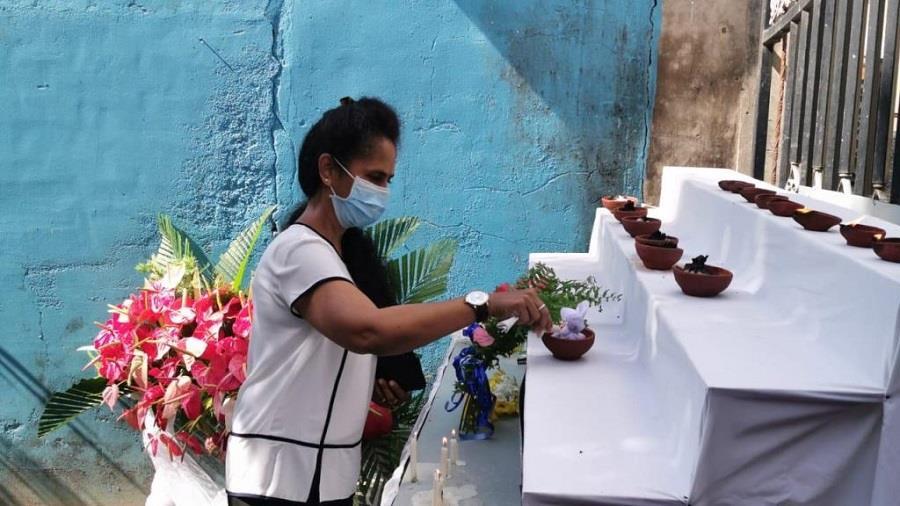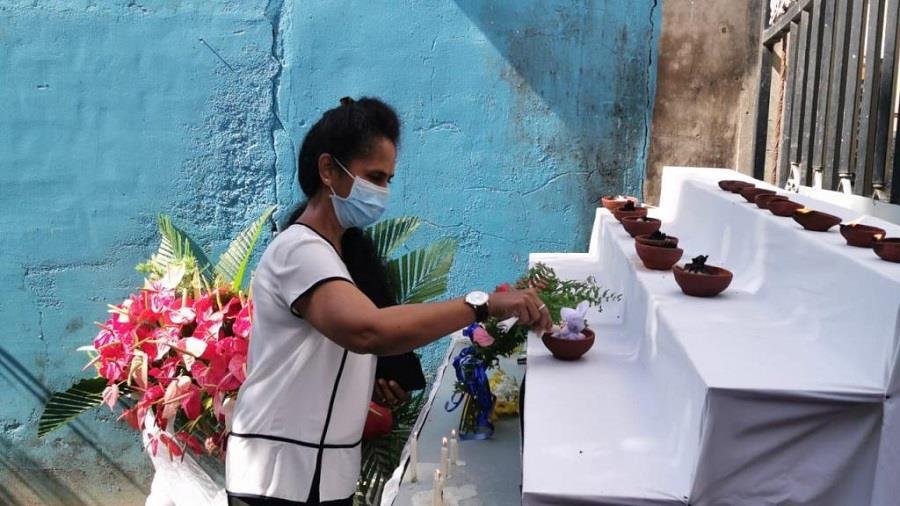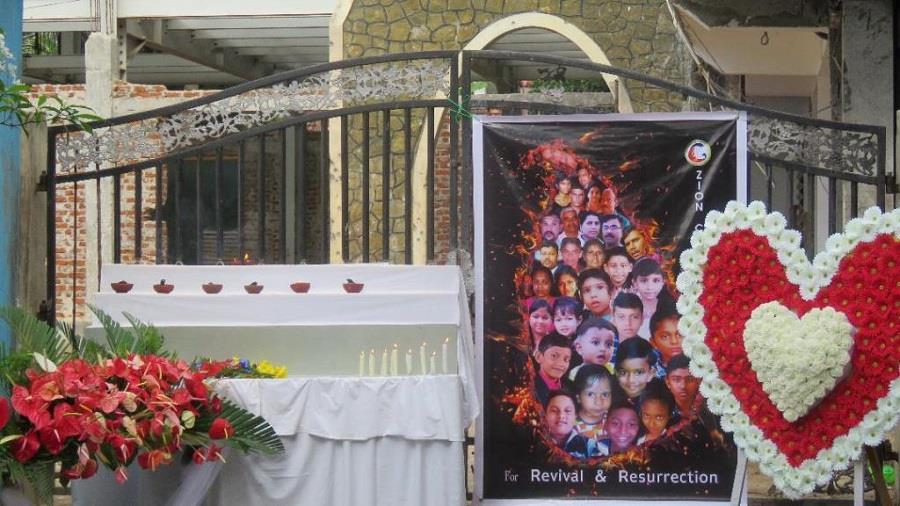
Sri Lanka- One year after Bloody Easter: Forgive but don't forget
(MENAFN- Colombo Gazette) 
By B. Mohan
The sound of church bells filled the air at 8.40 a.m. on Tuesday 21 April 2020, and two minutes of silence followed at 8.45 to commemorate those who lost their lives at this time 365 days ago.
Exactly one year ago, many in the island woke up to what they thought would be just another Sunday, while Catholics and Christians were to celebrate the holy day of Easter; to commemorate the resurrection of Jesus Christ. Little did they know, however, that this fateful day was about to turn into a living nightmare.
From 8.45 a.m. on 21 April 2019, a succession of well-coordinated attacks on churches and hotels were carried out. Suicide bombers below themselves up, resulting in carnage reminiscent of the civil war Sri Lanka had suffered through for 26 years; a time many believed was long behind them.
Bombs went off at St. Sebastian's Church in Negombo and St. Anthony's Church Kochchikade at 8.45 a.m.; The Kingsbury Hotel at 8.47 a.m.; two bombs went off at 8.54 at the Shangri-La Hotel, located just 500 meters away; one at 9.10 a.m. at the Zion Church in Batticaloa; at 9.12 a.m. at the Cinnamon Grand hotel, and a failed attempt at detonating a bomb was made at the Taj Samudra Hotel at 8.51 a.m., which was then detonated at a small inn in Dehiwala at 1.30 p.m.
The attack killed 269 dead and over 500 injured; around 45 children had died.
The smell of blood filled the air, and Sri Lanka began reeling from this shock attack that came from nowhere. Or so they thought.
Justice for the families
Speaking to Colombo Gazette, Police Media Spokesman SP Jaliya Senaratna stated that so far, 197 arrests have been made in connection to the bombings. Asked about the recent report that a second planned attack had been stopped, he stated that it was reported incorrectly and that rather, the subsequent attacks that were to occur had not progressed due to the arrests being made after the Easter bombings last year.
Although these arrests have been made, real justice has not yet been served to the families of the dead. People lost their mothers, fathers, brothers, sisters, sons, daughters, husbands, and wives, and still suffer to this day, and will continue to.
Addressing the congregation on Easter Sunday this year (12 April), Archbishop of Colombo Cardinal Malcolm Ranjith offered forgiveness to those who carried out the attacks. 'We did not hate them and return them the violence. Resurrection is the complete rejection of selfishness,' he stated.
However, forgiving does not mean forgetting.
Last Thursday (16), at a press conference addressing the media on commemorating the victims of last year's attack, Cardinal Ranjith thanked the Government for continuing their investigation into the incident and also stated: 'We owe it to the victims, to the dead, to ensure that these investigations are conducted thoroughly by the CID (Criminal Investigation Department) on all perpetrators and those who supported them, to be brought to justice.'
The same day the Cardinal made this request, six suspects were arrested including a lawyer, a customs officer, and brother of politician Rishad Bathiudeen, Riyaj Bathiudeen.
Asked SP Senaratne what the charges were against Riyaj Bathiudeen, he responded: 'There aren't any charges as yet that we have made against him. We have arrested him based on his interactions with one of the bombers days before the Easter attacks. Still we are making inquiries into that and when we uncover more information, we will charge him as appropriate.'
Since the attacks last year, then President Maithripala Sirisena appointed a total of two presidential commissions of inquiry (PCoIs) and a parliamentary select committee (PSC) as well. The report of the latter which was submitted to Parliament on 23 October last year, was made available to the public. The first PCoI appointed – headed by Supreme Court Justice Vijith Malalgoda – had also testified to the PSC.
However, the first interim and second interim reports of the five-member (second) PCoI appointed by former President Sirisena on 20 September last year, headed by Court of Appeal Judge Janak de Silva, which were submitted to President Gotabaya Rajapaksa on 20 December 2019 and 2 March 2020, respectively, have not been made public. The term of this PCoI, which was set to expire on 20 March, has been extended by President Rajapaksa by six months, till 20 September.
Asked SP Senaratne if the recent arrests were made after considering the contents presented in the latest report submitted by the PCoI, he responded that the arrests were being made based on information uncovered from the investigations, and shared: 'We are making the arrests as and when we uncover information during our police investigations.'
We knew, but did nothing
Soon after the attack, it was revealed that the mastermind behind the bombings was Zahran Hashim, the suicide bomber who detonated the first bomb at the Shangri-La Hotel. He had been operating under the National Thowheed Jammath (NTJ), an organization he founded in 2014 and used to spread his extremist ideologies and recruit followers.
It is now common knowledge that numerous complaints – about 150 as per reports – were made against Zahran Hashim and his teachings. However, none of these were acted upon by the local authorities in a timely manner.
Islamist extremism had started to rear its head in Sri Lanka as early as 2011, when reports were made of armed extremists in Kattankudy, a township close to Batticaloa in the East of the island.
Even in 2014, suspicions were raised in Parliament pertaining to four families that had visited Syria and got radicalized. This was the same year Zahran founded the NTJ.
In 2015, several complaints were made by Sufi Muslims against Zahran as he had incited violence against them with his followers appearing in a Sufi neighborhood with swords; two men were injured.
In 2016, Zahran had upped his media presence; videos were circulating on social media and other platforms showing him against backdrops of burning buildings and bloodied walls, stating making statements similar to: 'People ask, can you kill innocents? There is no such thing as innocent people in Islam. You are either a Muslim or a non-believer.'
The authorities were aware of and monitoring Zahran's activities at the time, but they did not take any action.
In 2017, Zahran had made a very public declaration at Hizbullah Hall in Katankuddy, stating that he had pledged allegiance to the Islamic State (IS). It was also reported that local authorities were monitoring this meeting. Zahran's preachings sounded alarm bells for the local Muslim community, and some of them took to the streets to protest his ideologies. However, Zahran managed to flee and so no action was taken against him.
The Digana Anti-Muslim riots in February/March 2018, according to then Deputy Inspector General of Police (DIG) Nalaka de Silva's testimony to the PSC, led Zahran to violent extremism. However, it can be argued that Zahran was radicalized long before that.
In October 2018, local authorities started taking Zahran more seriously and ordered for the Telecommunications Regulations Commission (TRC) and Sri Lanka Computer Emergency Readiness Team (SLCERT) to shut down his online presence. However, they were unable to do so, stating that the social media companies themselves would only be able to.
December 2018 saw the vandalism of Buddhist statues in Mawanella which were traced back to Zahran's followers. Two were arrested in connection to this incident. Upon interrogation of these suspects, the next month, in January 2019, around 100 kg of explosives and 90 detonators were discovered in Wanathawilluwa, a town in the northwest of Sri Lanka with easy costal access. It was clear that these incidents were the work of the same group.
However, even then, the authorities could not locate Zahran.
Of the four men that were arrested in connection to the cache uncovered in Wanathawilluwa, one was subsequently released; Ilham Ibrahim went on to detonate the second bomb at the Shangri-La Hotel.
Ilham and his brother Inshaf Ibrahim were recruited by Zahran about three to four months before the attack. lham and Inshaf Ibrahim were sons of one of the largest exporters of spices in Sri Lanka. Reports state that Zahran used their resources to finance the bloody attacks.
Several intelligence reports were also received from India, specifying the possible locations of the attacks, including on the morning of that Easter Sunday. However, no action was taken in this regard, and no alert was issued to the public. It has been uncovered that information was merely passed on from department to department; institution to institution.
Speaking to BBC, Prof. Roshan Gunaratne, who studied the growth of Islamic terrorism in the globe for 25 years, had said: 'They knew after that camp (Wanathawilluwa) was raided, that Zahran was behind this. Had they acted promptly, there could be no Easter Sunday attack.'
Are genuine steps being taken?
The PSC report submitted to Parliament last October details their findings, highlights the shortfalls in actions that should have been taken, and also puts forward recommendations on how to prevent similar occurrences in the future.
The PSC report details failures of the Secretary of the Ministry of Defense, IGP, Chief of National Intelligence (CNI), Director State Intelligence Service (SIS), Directorate of Military Intelligence (DMI), Attorney General's Department, President, Prime Minister, and the State Minister of Defense (note: These refer to individuals in those positions at the time of the attack).
Speaking to Colombo Gazette, senior researcher at the Centre for Policy Alternatives Bhavanai Fonseka shared: 'Despite the PSC report making key findings including leadership and structural failures, there is limited information as to whether genuine steps were taken to address the structural reforms required and hold accountable those responsible.'
Asked Police Spokesperson SP Jaliya Senaratne about bringing those responsible for allowing the attack, due to negligence in failing to act on the relevant intelligence received warning of the attacks – especially those in higher up positions – to book, he said: 'We are still analyzing the evidence.'
The PSC report also made the following recommendations (explained in detail in its report):
Asked Fonseka of CPA if she sees any action taken in this regard, she shared with the Colombo Gazette: 'I do hope the present Government is taking steps to initiate reforms. For example, one area of reforms recommended was in the security and intelligence sector…Questions must also be posed as to whether any reforms proposed in 2019 have been initiated to ensure there is no repeat of past mistakes and initiatives are transparent and accountable.
'Moreover, we must note that the PSC process demonstrated the need for the legislature to scrutinize the actions of the executive, provide for greater accountability, and raise important policy questions that impact all Sri Lankans…Unfortunately, Parliament was dissolved on 2 March 2020 and at present there is no legislature in Sri Lanka. And due to Covid-19, courts are also not fully functioning. In such a context, it is only the Executive that is functioning with no check on its power. This is indeed deeply troubling when we reflect on the failures that resulted in the Easter Sunday attacks and the need to have effective checks and oversight. This is also key to prevent a slide towards authoritarian rule and protect the rule of law and democracy in Sri Lanka,' she shared.
Whilst handling the Covid-19 pandemic is topmost in our minds, we need to ensure we do not forget the pain and agony bestowed upon families of the 269 victims of the Easter bombings last year. The road to justice may be long and hard, but if we keep pushing, persevering, and asking questions, we can work towards this end.
With the general elections being announced by the Election Commission for 20 June just last night, it is the perfect time to think back on the last year and also years past and decide on who we want to be representing our interests, and who has our best interests at heart. And when I say our, I mean all Sri Lankans, irrespective of religion, cast, and creed.

Legal Disclaimer:
MENAFN provides the
information “as is” without warranty of any kind. We do not accept
any responsibility or liability for the accuracy, content, images,
videos, licenses, completeness, legality, or reliability of the information
contained in this article. If you have any complaints or copyright
issues related to this article, kindly contact the provider above.




















Comments
No comment